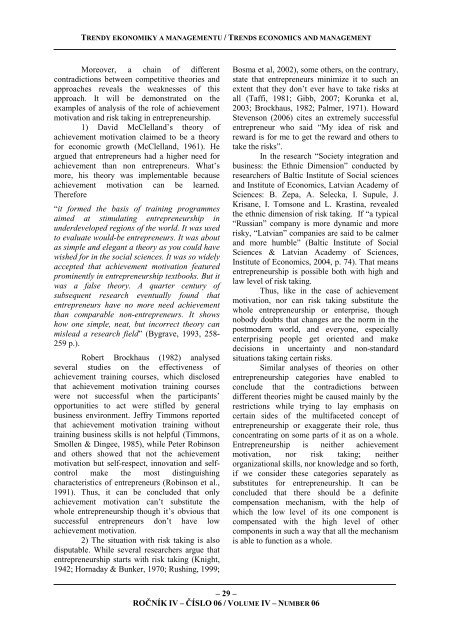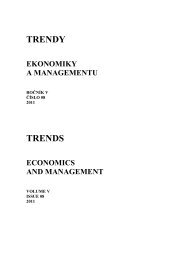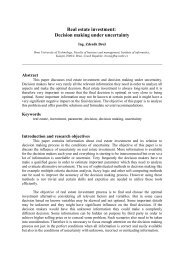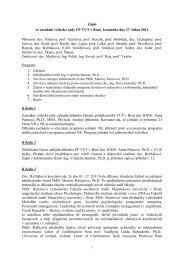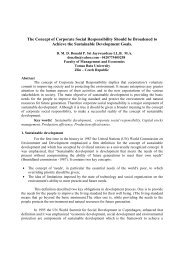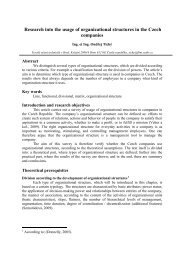Stáhnout toto číslo ve formátu PDF - Fakulta podnikatelská - Vysoké ...
Stáhnout toto číslo ve formátu PDF - Fakulta podnikatelská - Vysoké ...
Stáhnout toto číslo ve formátu PDF - Fakulta podnikatelská - Vysoké ...
You also want an ePaper? Increase the reach of your titles
YUMPU automatically turns print PDFs into web optimized ePapers that Google loves.
TRENDY EKONOMIKY A MANAGEMENTU / TRENDS ECONOMICS AND MANAGEMENT<br />
Moreo<strong>ve</strong>r, a chain of different<br />
contradictions between competiti<strong>ve</strong> theories and<br />
approaches re<strong>ve</strong>als the weaknesses of this<br />
approach. It will be demonstrated on the<br />
examples of analysis of the role of achie<strong>ve</strong>ment<br />
motivation and risk taking in entrepreneurship.<br />
1) David McClelland’s theory of<br />
achie<strong>ve</strong>ment motivation claimed to be a theory<br />
for economic growth (McClelland, 1961). He<br />
argued that entrepreneurs had a higher need for<br />
achie<strong>ve</strong>ment than non entrepreneurs. What’s<br />
more, his theory was implementable because<br />
achie<strong>ve</strong>ment motivation can be learned.<br />
Therefore<br />
“it formed the basis of training programmes<br />
aimed at stimulating entrepreneurship in<br />
underde<strong>ve</strong>loped regions of the world. It was used<br />
to evaluate would-be entrepreneurs. It was about<br />
as simple and elegant a theory as you could ha<strong>ve</strong><br />
wished for in the social sciences. It was so widely<br />
accepted that achie<strong>ve</strong>ment motivation featured<br />
prominently in entrepreneurship textbooks. But it<br />
was a false theory. A quarter century of<br />
subsequent research e<strong>ve</strong>ntually found that<br />
entrepreneurs ha<strong>ve</strong> no more need achie<strong>ve</strong>ment<br />
than comparable non-entrepreneurs. It shows<br />
how one simple, neat, but incorrect theory can<br />
mislead a research field” (Bygra<strong>ve</strong>, 1993, 258-<br />
259 p.).<br />
Robert Brockhaus (1982) analysed<br />
se<strong>ve</strong>ral studies on the effecti<strong>ve</strong>ness of<br />
achie<strong>ve</strong>ment training courses, which disclosed<br />
that achie<strong>ve</strong>ment motivation training courses<br />
were not successful when the participants’<br />
opportunities to act were stifled by general<br />
business environment. Jeffry Timmons reported<br />
that achie<strong>ve</strong>ment motivation training without<br />
training business skills is not helpful (Timmons,<br />
Smollen & Dingee, 1985), while Peter Robinson<br />
and others showed that not the achie<strong>ve</strong>ment<br />
motivation but self-respect, innovation and self-<br />
control make the most distinguishing<br />
characteristics of entrepreneurs (Robinson et al.,<br />
1991). Thus, it can be concluded that only<br />
achie<strong>ve</strong>ment motivation can’t substitute the<br />
whole entrepreneurship though it’s obvious that<br />
successful entrepreneurs don’t ha<strong>ve</strong> low<br />
achie<strong>ve</strong>ment motivation.<br />
2) The situation with risk taking is also<br />
disputable. While se<strong>ve</strong>ral researchers argue that<br />
entrepreneurship starts with risk taking (Knight,<br />
1942; Hornaday & Bunker, 1970; Rushing, 1999;<br />
Bosma et al, 2002), some others, on the contrary,<br />
state that entrepreneurs minimize it to such an<br />
extent that they don’t e<strong>ve</strong>r ha<strong>ve</strong> to take risks at<br />
all (Taffi, 1981; Gibb, 2007; Korunka et al,<br />
2003; Brockhaus, 1982; Palmer, 1971). Howard<br />
Ste<strong>ve</strong>nson (2006) cites an extremely successful<br />
entrepreneur who said “My idea of risk and<br />
reward is for me to get the reward and others to<br />
take the risks”.<br />
In the research “Society integration and<br />
business: the Ethnic Dimension” conducted by<br />
researchers of Baltic Institute of Social sciences<br />
and Institute of Economics, Latvian Academy of<br />
Sciences: B. Zepa, A. Selecka, I. Supule, J.<br />
Krisane, I. Tomsone and L. Krastina, re<strong>ve</strong>aled<br />
the ethnic dimension of risk taking. If “a typical<br />
“Russian” company is more dynamic and more<br />
risky, “Latvian” companies are said to be calmer<br />
and more humble” (Baltic Institute of Social<br />
Sciences & Latvian Academy of Sciences,<br />
Institute of Economics, 2004, p. 74). That means<br />
entrepreneurship is possible both with high and<br />
law le<strong>ve</strong>l of risk taking.<br />
Thus, like in the case of achie<strong>ve</strong>ment<br />
motivation, nor can risk taking substitute the<br />
whole entrepreneurship or enterprise, though<br />
nobody doubts that changes are the norm in the<br />
postmodern world, and e<strong>ve</strong>ryone, especially<br />
enterprising people get oriented and make<br />
decisions in uncertainty and non-standard<br />
situations taking certain risks.<br />
Similar analyses of theories on other<br />
entrepreneurship categories ha<strong>ve</strong> enabled to<br />
conclude that the contradictions between<br />
different theories might be caused mainly by the<br />
restrictions while trying to lay emphasis on<br />
certain sides of the multifaceted concept of<br />
entrepreneurship or exaggerate their role, thus<br />
concentrating on some parts of it as on a whole.<br />
Entrepreneurship is neither achie<strong>ve</strong>ment<br />
motivation, nor risk taking; neither<br />
organizational skills, nor knowledge and so forth,<br />
if we consider these categories separately as<br />
substitutes for entrepreneurship. It can be<br />
concluded that there should be a definite<br />
compensation mechanism, with the help of<br />
which the low le<strong>ve</strong>l of its one component is<br />
compensated with the high le<strong>ve</strong>l of other<br />
components in such a way that all the mechanism<br />
is able to function as a whole.<br />
– 29 –<br />
ROČNÍK IV – ČÍSLO 06 / VOLUME IV – NUMBER 06


